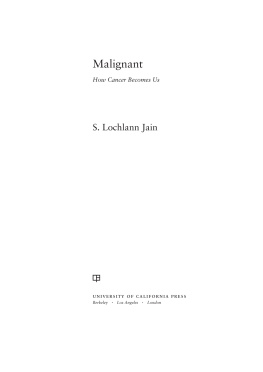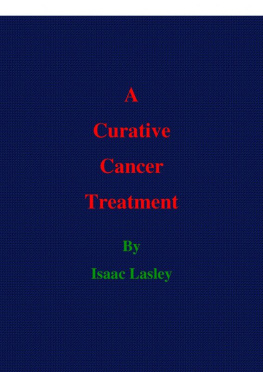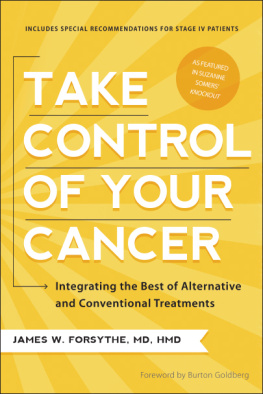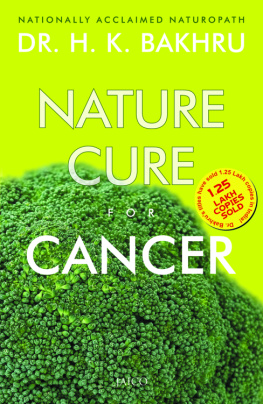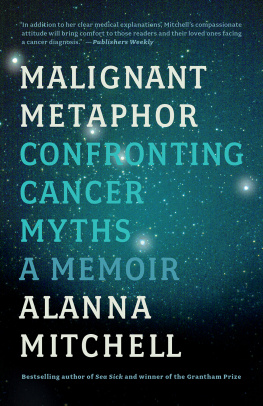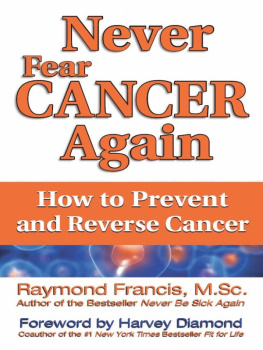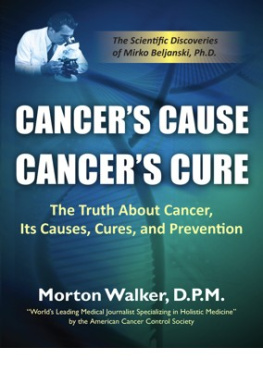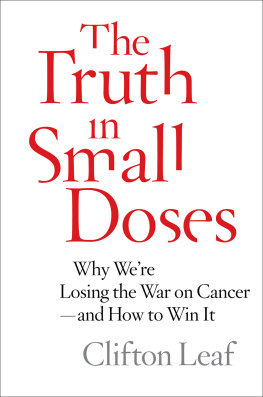
Praise for Malignant
An extraordinary work of disciplined observation and astonishing precision, Malignant reveals how the common course of cancer has worked its way into the American imaginary.
Jonathan Simon, Adrian A. Kragen Professor of Law, UC Berkeley School of Law
In my nineteen years as a cancer survivor I have never read a book that was so spot-on when it comes to understanding the inadequacy of our current plan of attack in the war on cancer, which we have been fighting for over thirty years.
Natalie Conforti, three-time young adult cancer survivor and advocate
Lochlann Jain is the rare academic whose writing is as beautiful as her ideas.
Carl Elliott, author of White Coat, Black Hat: Adventures on the Dark Side of Medicine
In this alternately galvanizing and moving report, Jain offers both a queer patientseye view and an astute scholars analysis. Malignant extends the scholarship and activism surrounding HIV/AIDS to alert us that, in the case of cancer, ubiquity = death.
Lisa Duggan, author of The Twilight of Equality? Neoliberalism, Cultural Politics, and the Attack on Democracy
As cancer increasingly becomes a metaphor for our lives, what do we do about the growing evidence of the role of the environment in cancer causation? Jains complex and nuanced picture challenges the reader to dig down for our own conclusions. Malignant will be of enormous value.
Judy Norsigian, Executive Director, Our Bodies Ourselves
Lochlann Jain offers a fresh and profound set of insights about the total social fact of cancer in the United States. Patients and cancer prevention advocates will benefit enormously from reading this fascinating book.
Richard Clapp, Professor Emeritus, Boston University School of Public Health
How is it possible, S. Lochlann Jain asks in this moving, brutally honest book, for cancer to be inside so many people and remain outside society? This searing exploration... helps us understand why government, corporate, and military leaders are so reluctant to embrace cancer as a public issue and how their failure to do so affects our understanding of the disease.
Gerald Markowitz, coauthor of Deceit and Denial: The Deadly Politics of Industrial Pollution
Both extremely personal and highly analytic, Malignant offers an idiosyncratic, irreverent, and probing mash-up of cancer in the U.S. today. The cancer that emerges is untidy, more a set of relationships than a thing. While highly critical of standard claims to authority and expert knowledge, suppressed politics, misplaced priorities, and victim blaming, Jain retains empathy and humor.
Robert A. Aronowitz, author of Unnatural History: Breast Cancer and American Society
Jain takes an anthropologists approach to exploring the intricacies of an experience on a shared cultural stage. This book brings new insights into the lived struggle of a patient, activist, and academic in understanding the full complexity of cancer.
Karuna Jagger, Executive Director, Breast Cancer Action
Lochlann Jains brilliant memoir/documentary offers us a thoroughly uncomfortable, provocative, and enticing read. We are led, step by meticulously researched step, into the abyss of the cancer culture, all the while being invited into the intimacy of Jains own cancer story as a young adult. Malignant is a necessary read for our time, a remarkable achievement.
Janie Brown, Executive Director, Callanish Society
From the minute you start reading the first pages of this book, to the moment (hours later) when you arrive at its last pages, Lochlann Jain manages to grip you and hold you captive. The writing is marvelous, and the scholarship is incrediblebut you arent prepared for the disarming humor, or the delicate dissection of the psyche that Jain achieves. I could not stop reading this book. In the end, found myself enriched and wiser for it.
Siddhartha Mukherjee, author Emperor of All Maladies: A Biography of Cancer (Pulitzer Prize winner)
Malignant is a brilliant piece of medical anthropology, a beautifully poetic fusion of the personal and the political.
Robert N. Proctor, author of Golden Holocaust: Origins of the Cigarette Catastrophe and the Case for Abolition
Malignant
The publisher gratefully acknowledges the generous support of the General Endowment Fund of the University of California Press Foundation.
Malignant
How Cancer Becomes Us
S. Lochlann Jain

UNIVERSITY OF CALIFORNIA PRESS
BerkeleyLos AngelesLondon
University of California Press, one of the most distinguished university presses in the United States, enriches lives around the world by advancing scholarship in the humanities, social sciences, and natural sciences. Its activities are supported by the UC Press Foundation and by philanthropic contributions from individuals and institutions. For more information, visit www.ucpress.edu.
University of California Press
Berkeley and Los Angeles, California
University of California Press, Ltd.
London, England
2013 by The Regents of the University of California
Library of Congress Cataloging-in-Publication Data
Jain, Sarah S. Lochlann, 1967
Malignant : how cancer becomes us / S. Lochlann Jain.
pagescm
Includes bibliographical references and index.
ISBN 978-0-520-27656-7 (hardback) ISBN 978-0-520-27657-4 (paper) ISBN 978-0-520-95682-7 (ebook)
1. CancerGovernment policyUnited States.2. CancerResearchUnited States.3. CancerRisk factorsGovernment policyUnited States.4. CarcinogensGovernment policyUnited States.I. Title.
RC 276. J 352013
362.19699'4dc23
2013018303
Manufactured in the United States of America
22 21 20 19 18 17 16 15 14 13
10 9 8 7 6 5 4 3 2 1
In keeping with a commitment to support environmentally responsible and sustainable printing practices, UC Press has printed this book on Rolland Enviro100, a 100% post-consumer fiber paper that is FSC certified, deinked, processed chlorine-free, and manufactured with renewable biogas energy. It is acid-free and EcoLogo certified.
To my family:
Chosen, who let me in.
Blood, whom I would have chosen.
Contents
Introduction
We Just Dont Know It Yet
I knew a woman who went to medical school because she wanted to be with people at critical, life-changing moments; she imagined that sharing dire information would create an intense mutual experience.
My own decidedly undramatic life-changing moment took place in a tiny, somewhat battered office. The doctor flipped back and forth and back again among the three pages of the report she had received from my radiologist. As she fidgeted, I surveyed the posters on her office wall of Banff National Park, in the Canadian Rockies, where I had been hiking the previous day as I wound up a visit with my parents before flying back to my job in California.
As my eyes wandered, I could tell the doctor really, really didnt want to look at me. Finally, she glanced up and, in a last-ditch effort to avoid her part in the vaunted Bad News Experience, asked if I already knew what the report said. I shook my head.
A few minutes later, as we drove away from the curling-edged posters in that office and toward the surgeons office to see how soon I could get the cancer out, my mother called my dad and asked him to look after the kids for another couple of hours. Meanwhile, I looked at more picturesthis time, those in the brochure the nurse had given me. I speculated on what invasive meant. Half of all Americans will be forced to consider this word at some point, and half of those will die wondering why the billions of research dollars thrown at the word havent exterminated it from the English language.
Next page
